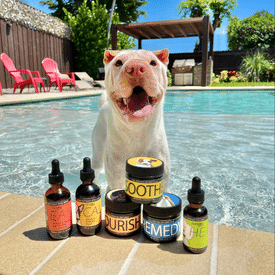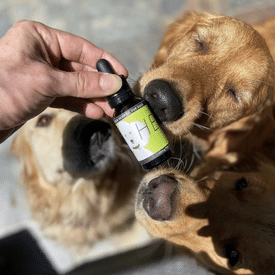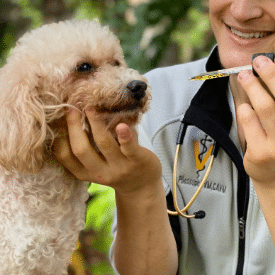Antibiotics for Dogs – An Alternative Method with Dr. Zac Pilossoph

Recent research is addressing the antibacterial properties of cannabis. Resistance to antibiotics is becoming increasingly more common. A study by the Journal of Natural Products determined all five major cannabinoids (cannabidiol- CBD, cannabichromene, tetrahydrocannabinol (THC), cannabigerol, and cannabinol) showed significant activity against methicillin-resistant Staphylococcus aureus (MRSA).
Research conducted at the University of Southern Denmark concluded that cannabidiol, or CBD, combined with antibiotics was more effective in regard to some infections than the use of antibiotics alone. In the study, researchers analyzed how different compounds fight against bacteria, like Staphylococcus aureus (a gram-positive bacteria).
Scientists analyzed cell cultures with the bacteria and then with either bacitracin (BAC), CBD and BAC, ethyl alcohol, and a control. Each cell culture was subjected to the bacteria for two and a half hours.
The study concluded CBD was able to increase the effects of bacitracin against Staphylococcus and other gram-positive bacteria. The combination of BAC and CBD was not effective against gram-negative bacteria. The combination of CBD and BAC involved a lack of cell separation during division, in addition to downregulation of the gene, ezrA.
This study is progressive and provides some great leaps forward. Further research must be conducted to confirm its findings, but it definitely provides us with a great deal of promise, particularly when considering the concerns with antibiotic resistance.
Multimodal Applications
To determine if this concept of combining CBD with an antibiotic could be utilized systematically, further research must be conducted. As far as being used to help as a topical antibiotic and/or an antifungal, that is a concept we already know with firm evidence that could be incredibly helpful due to CBD’s antifungal and antimicrobial properties.
According to research, cannabis products could potentially treat various forms of dermatitis, skin cancer, and systemic sclerosis among other ailments. The receptors from the endocannabinoid system (CB1 and CB2) can be found in our dog’s skin and have been found to work with cannabinoids to reduce inflammation. A study published in the American Journal of Veterinary Research stated the endocannabinoid system “may potentially be a target for the treatment of atopic dermatitis and other inflammatory diseases in companion animals.”
Other methods to offer a pet who has some sort of skin infection, for example, include utilizing colloidal silver and betadine solutions. Colloidal silver solution is made up of microscopic particles which are able to disrupt bacteria growth and effectively kill pathogens. Colloidal silver solution contains tiny particles of silver into a solution. The microscopic particles are able to penetrate cells and fight against bacteria.
It’s critical not to confuse ionic silver with colloidal silver. Although they sound alike, the effects are much different and could result in long-term damage if the two are confused. Ionic silver is not shown to have antimicrobial activity. Ionic silver solutions also cause concern in the medical community because silver ions are extremely unstable. Silver ions are missing an electron and, as with any ion, are desperately looking to find one. What this means is that, if silver ions are ingested, the ionic silver can be absorbed by the fat or protein in the body, accumulate, and remain in the body rather than be excreted. This could lead to a condition known as argyria; an irreversible skin condition where the skin turns blue-grey in color and/or toxicity.
The active ingredient in Betadine solution, known as povidone-iodine, is a well-known antiseptic fighting against germs and microbes that may be causing any sort of skin irritation or skin infection. You can often find Betadine in a first-aid kit to prevent infection of minor wounds.
Final Thoughts
The potential benefits of utilizing a multimodal therapeutic approach for skin and coat related conditions are gaining more and more credibility. When used appropriately, either alone or in conjunction with pharmaceuticals, CBD, colloidal silver, betadine, and other remedies, have the ability to provide much-needed relief, and may result in quicker healing periods. Lastly, we all need to be cognitive of the fact that every day, antibiotic resistance is expanding. If alternative solutions can help slow this growing problem, then this gives even more merit to considering alternative therapies to aid or replace traditional methods.















